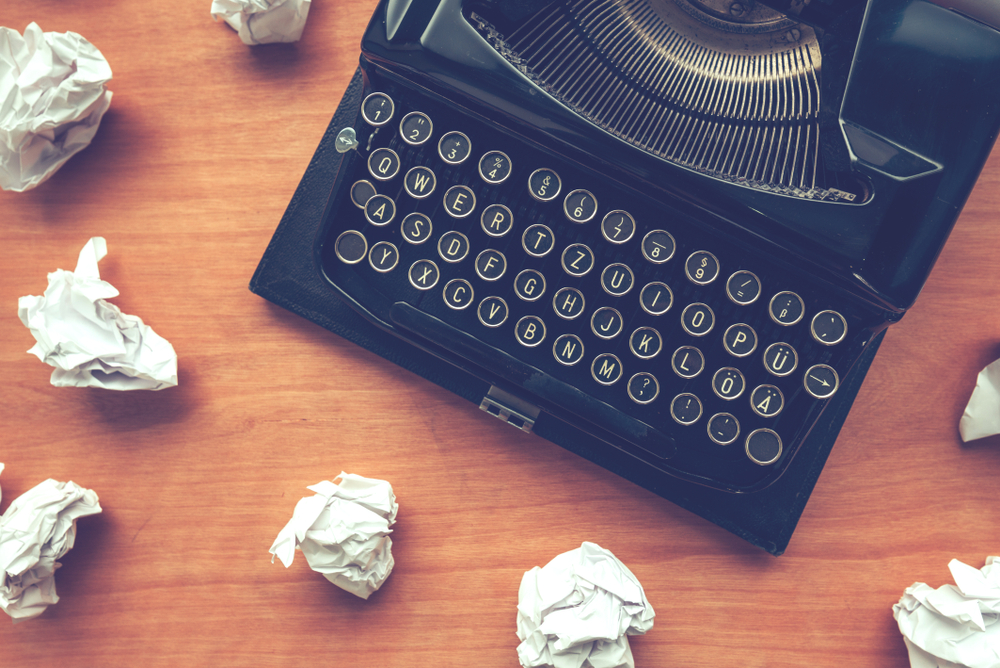What Kind of Writer Are You?
New Year, New You… same book. Another year has come and gone and you’re still working on your manuscript. A finished novel is your shiny gold ring, your throne made of iron swords, or your moon that’s no moon somewhere in a galaxy far away. Why can’t you complete your hero’s quest? The truth is, we writers often become so focused on our style and craft, we forget one of the most important parts of writing: our discipline.
Many of us struggle to have an honest conversation with ourselves about the strengths and weaknesses of our writing habits. We all want to believe that we’re taking so long because we’re pulling a George R.R. Martin and carving out a masterpiece worth the wait, but that’s not always the case. Writing a book takes time, but you may be keeping yourself from making the progress of which you’re capable. How, you ask? Take our quiz to learn about your writing discipline and how it could be impeding your progress:

1) The Shiny New Idea Writer
The Shiny New Idea Writer is a writer who is constantly coming up with new book ideas. As a Shiny New Idea Writer, inspiration is always around the corner. Whether you’re walking through the park, watching a movie with friends, or even just taking a shower, you’re constantly racing toward your notebook or phone to jot down your latest brainstorm. You pray that the day never comes when your notebook or phone is discovered because your crazy scrawls would likely land you in the nearest mental institution.
Strengths:
You will never be one of those writers who struggles to think of their next story. In fact, you have so many ideas that you could even give some away to less imaginative writers (but you won’t, though- they’re yours). Because you find inspiration virtually anywhere, you’re generally excited and always ready to engage in a passionate discussion of any kind: from your latest book idea to your latest TV or literary obsession. When a new idea comes your way, you are overcome with excitement, making incredibly detailed plans and outlines including plot twists, character arcs, and even specific lines of dialogue. People may assume that you simply have these fleeting and vague musings, but what you actually have are dozens of fully fleshed out book plans– an invaluable currency in the writer-world.
Weaknesses:
Though you’re overflowing with high-quality material, you have trouble sticking to one project at a time. You often find yourself combing through your series of notebooks and phone notes, disorganized and unsure of where to even begin. They’re all amazing ideas, which one is best? If you’re overwhelmed and having trouble finding a place to start, we recommend using a friend as a sounding board. Pitch your friend a few of your ideas. They can tell you which one they like best and, if you find yourself disappointed by their answer, then you’ll know which one you really want to work with.
Another struggle for The Shiny New Idea Writer is that, even when they do settle on one idea, they have trouble seeing it all the way through. Because, as inevitably as the sun rises each morning, a new idea will strike. And when it does, all of that excitement for the book they’re writing evaporates and is replaced by an irresistible longing for this shiny new idea. If you’re in the middle of writing a book and a new idea comes…fight it. We know the urge to drop everything and plot it out is strong, but you’ll get trapped in a time loop and you’ll never finish a single book. Your ideas are a gift, don’t let them become a curse.

2) The Closet Writer
The Closet Writer is basically a writing vampire. The sun (AKA the idea of someone seeing your book) burns your skin so you only come out at night. You also can’t see yourself in a mirror because, if you could, you’d see how silly it is for you to hide. You’ve sustained several hand injuries from slamming your laptop closed too quickly because you heard a noise downstairs. Any time you’ve contemplated letting others in on your writing, you tell yourself one of the following: a) It’s for me not anyone else, b) What business do I have writing a book? c) People will hate it, d) It’s too personal or e) AHHHHHHHHHHHH! Writing is an incredibly personal art and it takes a lot of courage to share it, and you just don’t have that courage yet.
Strengths:
Every writer should start out at least a little bit closeted. Even if you have told people you’re writing a book, your instincts to wait a bit before sharing are correct. The process of getting your book off of the ground should be between you and the page- that’s it. Because it’s very easy to get discouraged or overwhelmed when you’re clogging your writing up with other people’s opinions from very early on. Right now, your book is only you, untainted by the outside world or anyone’s opinions or criticisms. Your cases of writer’s block are minor to nonexistent because there’s very little pressure when writing is just between you and your characters. That pureness is a beautiful thing to be savored and appreciated for a little while throughout the writing process.
Weaknesses:
The problem in this writer type lies when you let your work be closeted far longer than it should be. We know the prospect of sharing your work and having someone criticize it can be horrifying to think of, but criticism is the only way we learn and improve. If you want your book to be as good as it can be, you have to open it up and let others be a part of it too. Sure you’re bound to get some criticisms, but the important thing is to know the difference between those that are helpful and those that are not. And to remember that you don’t need to listen to every criticism. If someone tells you to change something that you feel very strongly about- don’t. At the end of the day, it’s your book and it should reflect you, not them. So be brave, be strong, and let your work out of the closet. We promise the sun won’t burn your skin.

3) The Over-writer
The Over-Writer is a writer who is always exceeding their anticipated page count. This is the type of writer who was going for a 70,000-word book and accidentally ends up at the 170,000-word mark…oops. As an Over-writer, you’re incredibly detail-oriented, spending weeks and months researching specific minutiae. Everything from the types of clothing during a time in history to the symptoms of bipolar depression to their protagonist’s shoe size when they were ten- you’ve thought about it. Over-writer’s pray every day that no government official is monitoring their Google searches because they don’t know how to explain why they Googled ‘how a body decomposes in space.’
Strengths:
Because you’re incredibly detail-oriented, you’re the least likely of the writer personalities to have any inaccuracy or error slip through the cracks. You check and triple-check every fact while also anticipating every possible fan question. People could spend years excavating your work and never spot a plot hole. You’re also very good at scene writing, painting very vivid and colorful images. Because you already have a character history on each character that makes an appearance in your book (even the mailman who has one line) every line of dialogue, mannerism, and action included is purposeful and makes character motivation very easy to follow.
Weaknesses:
Being extremely detail-oriented can be a double-edged sword (and not one from your favorite fantasy novel). Although plot holes are non-existent, you struggle with finding the correct pacing for your book. You feel that every moment and detail in your book is equally as important so you spend as much time describing the type of armor as you do the battle, which will lose you a lot of readers. As an Over-Writer, an editor will be both your best friend and your worst enemy because they’ll take an ax and chop up a large chunk of your beautiful prose. But they’re a necessary evil because, unlike you, they know the difference between an important and an unnecessary line. For this type of writer, we don’t recommend trying to fix your problem in the writing stages. Heck, there are writers out there who’d kill for your ease at hitting your page count (and we’ll get to them later). In addition, if you’re constantly second-guessing yourself in the first draft stage, your writing quality will go down fast. Instead, wait until the editing stage to look over your work and ask yourself with each line, “Does this line give important information about one of my characters? Does it further the plot?” If the answer to both questions is no, remove the line. Don’t roll your eyes, you know we’re right.

4) The Under-writer
This isn’t the type of Under-writer you’re familiar with (though they may be a bit of a liability). The Under-writer is the antithesis of our friend the Over-writer as they struggle to hit their word count goals. As an Under-writer, you’re also detail oriented, but to a fault. You’re constantly overthinking each line you write instead of letting the words flow. Although you typically churn out gorgeous first drafts, it takes roughly five times longer for you than for your Over-writing peers because you don’t allow yourself to write badly. Any great writer will tell you that your first draft should be bad, but you still get down on yourself in the editing process if you see any sloppy writing. To fix this, your solution is to make even your first drafts amazing.
Strengths:
The Under-writer’s strength lies in their prose. Because you put so much stock in every word you write, your drafts will be trimmed to exactly the right length and your sentences will contain no extra or unnecessary words. You have a very systematic approach to writing, knowing the elements necessary in a scene and always having a checklist going in your head to make sure each of them is included. You’re very conscientious of staying right in the sweet spot with your writing- not too much but not too little. You’re also good at showing rather than telling, using mannerisms and action to hint at your character’s inner thoughts or ideas. Readers will enjoy your writing because it doesn’t hand them every detail on a silver platter. The Under-writer operates under the assumption that their reader is a relatively intelligent and quality reader who will be able to pick up on details and hints without shoving them down their throats.
Weaknesses:
Because the Under-writer overthinks every word before writing it, writing can become choppy and won’t flow as well as other writing styles. That checklist in your head, although an incredibly helpful tool in the editing stage, can be detrimental in the initial first draft stage. Rather than allowing details to come out and flow naturally, your writing may feel more like a checklist of scene elements with rough transitions and little added flair. Our best advice for this type of writer: be kinder to yourself. Every great writer throughout history has written bad prose in their first drafts, allow yourself to do the same. Throw out the checklist at first and just follow the scene as it progresses naturally in your mind. Save your masterful diction and your checklist for draft number two.

5) The Fifty-Steps-Ahead Writer
This is the type of writer who has their head so high in the clouds that they can’t see what’s right in front of them (I.E. all the work they have left to do). You’re the type of writer who really believes in your work, so much so that (even though you’ve only written two chapters) you’re already looking into publishing options and thinking about who would direct and star in a movie adaptation of your book. Although believing in your book and pushing for yourself are great qualities to have for writers, you tend to spend valuable hours that you could be writing your book on researching and emailing literary agents or publishers.
Strengths:
As a writer, dreaming big is never a bad thing. In fact, being so ambitious about your book means that you’re likely equally ambitious as a writer. You have a frankly ginormous book idea, the characters are fleshed out in your mind and (whether it’s a fantasy trilogy or a dramatic memoir) it’s nothing short of epic. Why else would you already be thinking so far ahead if you weren’t so sure it would be amazing? Your confidence in real life makes you an equally confident writer, allowing your prose to flow out well throughout the various drafts. You could fill an ocean with all of your ideas and your passion for this book. And when the time comes to push for a book deal (unlike other writing types) you’ll take to it like a fish to water. You believe in your book so much that no salesman on earth could sell it better than you can.
Weaknesses:
The key phrase from the previous paragraph is this- when the time comes. This type of writer struggles taking things one step at a time. They want to prepare for the future, they want to ensure that their amazing book will be read by millions when the time comes to publish. They think, in order to do that, they need to start looking at publishing options as soon as they begin the writing process. Unfortunately, they couldn’t be more wrong in that regard. Rather than ensuring that you have a publisher by the time your book is finished, it will actually decrease your options drastically if you start to research literary agents or publishers before your book is finished. Publishers will only review a completed manuscript. And literary agents, specifically, will only take submissions one time- and that includes submissions with mistakes, errors, or ones that don’t follow directions correctly. Therefore, if you attempt to submit before you have a completed manuscript, you’ll have been rejected by half of your available options by the time your book is completed. Our advice: take everything one step at a time. Your writing will take longer and lack quality if you’re constantly daydreaming about future publishing opportunities. Focus on creating a good book, the rest will come in time.

